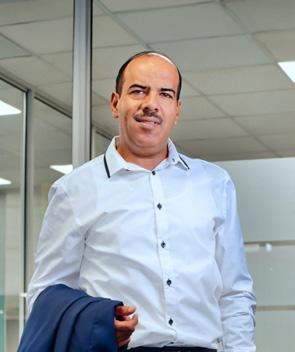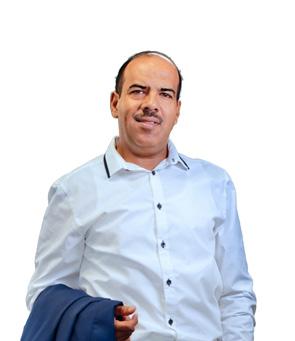




PRODUCTION: Jamie Waters
Link Africa’s CEO Imran Abbas is delighted with the progress made in the past 12 months, especially following the recent acquisition of BitCo Telecoms and the formation of Cloud Dynamics. Now, we all three companies operating together, and with a major opportunity in sub-Saharan Africa to connect the unconnected, Link Africa is perfectly positioned for continued growth.


//In 2023, Link Africa – the largest provider of cost-effective, high-speed, open-access telecommunications infrastructure in South Africa – was on a high after a new management team was put in place. Headed by industry veteran CEO Imran Abbas, a new vision and strategy was put in place focusing on an open-access model. The hope was that more of the country, and continent’s, unconnected could be included in an increasingly digital world.
Speaking to Enterprise Africa, Abbas said that the company was fuelling a national imperative to bring more people online by rolling out a bigger and more diverse network.
Today, the company continues with its long-term vision but has strengthened its position following the acquisition of BitCo Telecoms, a leading mixed telecoms solutions provider. BitCo holds a strong position in the market with a brand that is recognised throughout the country.
For Abbas, the acquisition is
about much more than just product diversification. It adds scale and excellence, while allowing for vastly improved product and service delivery.
“Link Africa was a layer one, layer two service provider – only providing infrastructure,” he tells Enterprise Africa. “I had two strategies last year; firstly, to move into Over The Top (OTT) services via a ISP. We also wanted to
create a separate company providing the services of an ISP which we have done with Cloud Dynamics.
“We have acquired BitCo as an ISP which takes us up the stack, and with the establishment of Cloud Dynamics we can now offer OTT including security, cloud services, and unified comms which a normal ISP wouldn’t do.”
At the same time, the group

can now offer enhanced network coverage and reliability, making the most of combined networks across fixed and wireless infrastructure.
Link Africa brings fibre strength and BitCo brings wireless options.
“The two networks complement each other and give us extended coverage in the market. The acquisition will encourage greater investment in technology as well as innovation, and customers will benefit through improved products and services,” says Abbas.
Outgoing CEO at BitCo, Jarryd Chatz, said: “I am eagerly anticipating the continued growth and success of both BitCo and Link Africa in the competitive telecom arena. These two companies will undoubtedly spur each other on to greater heights of excellence.”
Bringing two companies together is never an easy task, especially when both are operating at scale and working across similar but ultimately different technologies.
Abbas and the management teams had to quickly ensure there was no culture clash and clients continued to receive uninterrupted service of the level expected from an industry leader.
“It was a little painful - it took too long,” he says of the acquisition process. “In South Africa, whether it’s a small company acquiring a big company or the other way around, it’s the same long process that takes 18 months. The regulations and tribunals take a very long time, and it hurts both businesses.”
Despite these challenges, the companies have been successful coming together. In fact, Abbas
details significant positivity among staff on the BitCo side of the deal, with clear expectations and goals put in place from the beginning allowing for a cohesive push.
“We did a survey last week among employees on the BitCo side and we wanted to get some measurement on where they are. We did this six months ago, before we started the process and now we have completed further research. It’s positive to note that there has been a 10% improvement on the employee set and that is good news because it often goes the other way. We have shared an integrated structure, and on day one I shared plans for day 30, day 60, day 90 and day 100 with all employees. We are sticking to those plans and that is positive. I think it is going very well.”
Link Africa has a presence across
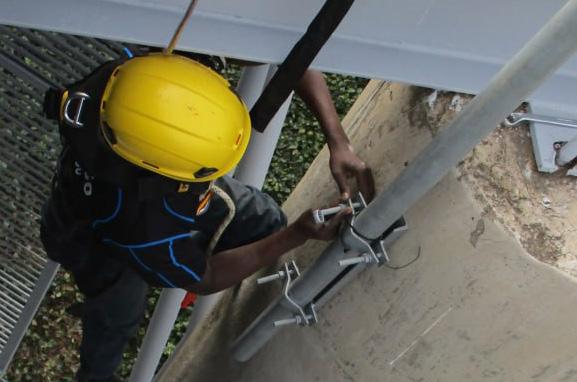
South Africa, operating since 2011, and BitCo has grown its presence since 2006. Because of the depth and reach of the individual brands – both well-known across multiple channels – Abbas is keen to retain both identities separately. BitCo is a lead sponsor of Cricket South Africa and Link Africa is an athletic sponsor of participants across various cycling and running events. Through these initiatives, and other similar projects, both brands have amassed strong recognition. Abbas hopes that through integrating passively, benefits will be passed to end users.
“We are joining the networks and they will integrate with each other, and it’s the same with the people. The strength is our diversification, now across wireless and Wire LAN. It gives
us different opportunities and it helps us to be able to provide a temporary solution to customers while still working on the fixed Wire LAN solution so that we can provide a temporary microwave, point-to-point, point-to-multipoint link for them. The waiting time on delivery is far less now, and we are utilising those benefits in the market.
“We will now get the best of both worlds in terms of integration, ensuring that there is a fully converged service for the customer and a fully converged network for the future. We are going to provide OTT services with neither Link Africa or BitCo providing this previously. Through AI, we are looking at how we can provide a seamless network and become Metaverse ready – possibly the first network in Africa to achieve this. Obviously, we will reduce
latency and improve technology and these benefits will be significant two or three years down the line.”
A core focus for Link Africa has always been to provide products and services at a cost-effective price. With the convergence of the network with BitCo, there is hope that prices across some services can be improved as the company looks to feed into its other core value – improving connectivity across the region.
“There should always be a benefit to the customer in the end,” states Abbas. “When we look at the advantages of combining the networks, specifically how that translates into more cost-effective products or services otherwise it’s no use trying to do this. If there is no benefit to the consumer, we are only fooling ourselves. We are
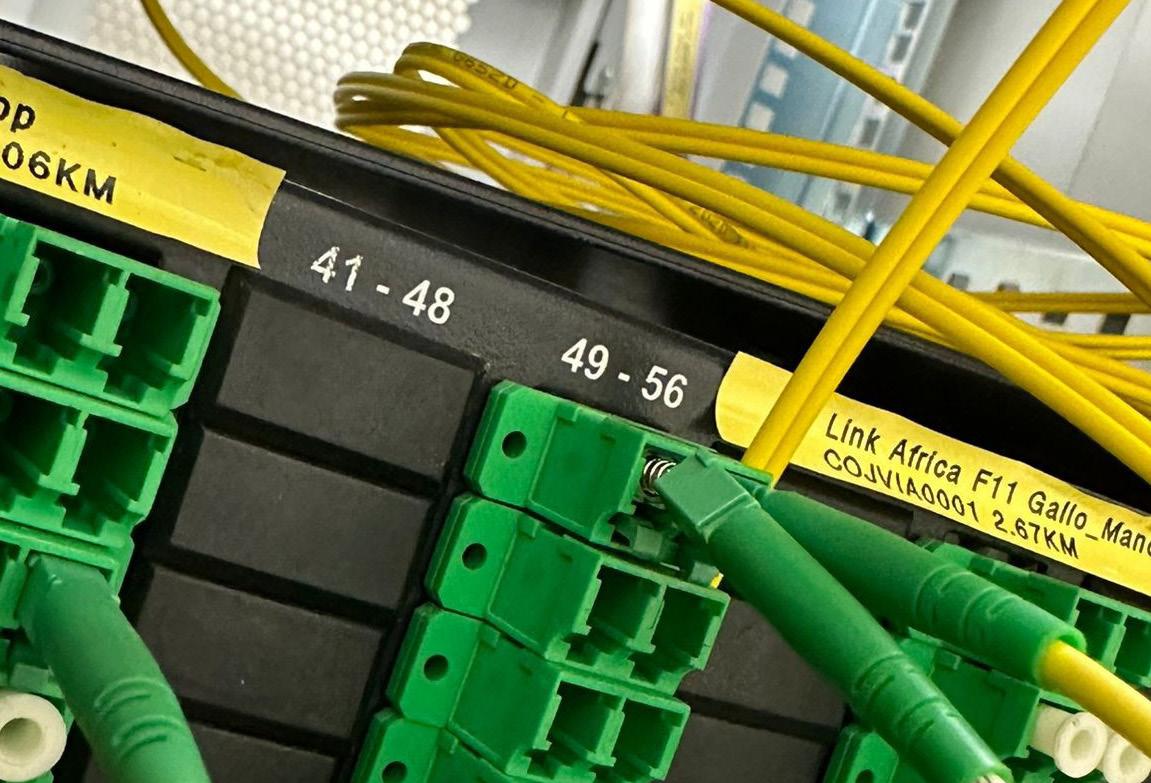

definitely not about starting price wars – we can’t afford that, but we definitely want to pass benefits to the end user. In fact, we are looking at better pricing within the first year.”
Post-acquisition, the Link Africa focus on growth through the open-access model – where service providers share physical infrastructure – remains the preferred strategy. Abbas calls open-access his ‘bible’ highlighting the work he has done over the years with Facebook and other brands, all over the world, promoting the benefits of the model. Through openaccess, Link Africa will connect more of the unconnected and transform southern Africa’s digital landscape.
“We are signing partnerships with municipalities to reach more remote
areas and we are looking at coming up with different solutions around connectivity. Getting fibre there is not viable or feasible for shareholders of any company in Africa,” he says. “We are looking at wireless solutions and an aggregation point to bring the traffic back to a main metro. We have started one project in KZN and we are looking at expanding in other areas.
“Operators in SA, and across the world, that duplicate infrastructure are wasting so much. That money could have been spent better connecting
// THROUGH AI, WE
the unconnected. Competing on infrastructure means nothing if you don’t connect the unconnected, improve value in the country, or increase GDP of the country. Building infrastructure and spending shareholder money means absolutely nothing. My belief is that we should share infrastructure and networks and compete on the service level. It’s not all talk – we make our network available to anyone that wants access to it. We have even offered fibre for free for companies that can offer the same for us.”
CAN PROVIDE A SEAMLESS NETWORK AND BECOME METAVERSE READY – POSSIBLY THE FIRST NETWORK IN AFRICA TO ACHIEVE
THIS //
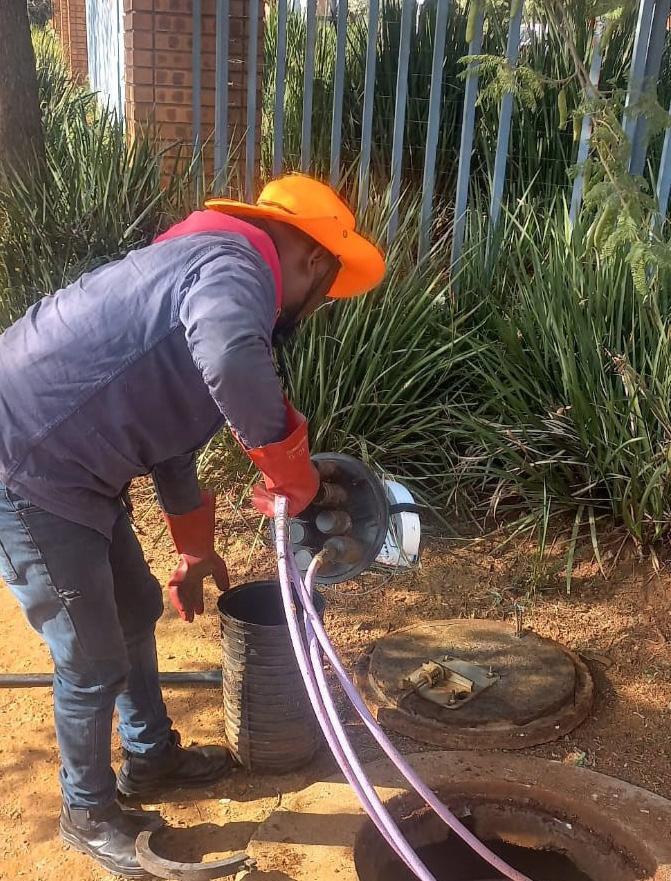
He adds that the company will also remain focused on customers in business, enterprise, and wholesale rather than bringing fibre to the home (FTTH) at this stage.
A vital string in the Link Africa bow is the company’s patented FOCUS™ system where fibre cables can be installed alongside other utility infrastructure such as water or sewerage pipes, eliminating the need for costly trenching and re-trenching. Of course, there are limitations, but FOCUS™ offers major opportunities across the continent.
“If you manage this well with municipalities you can provide a far more reliable network. Very rarely do you have trenching or digging from third parties because permits are required around the existing
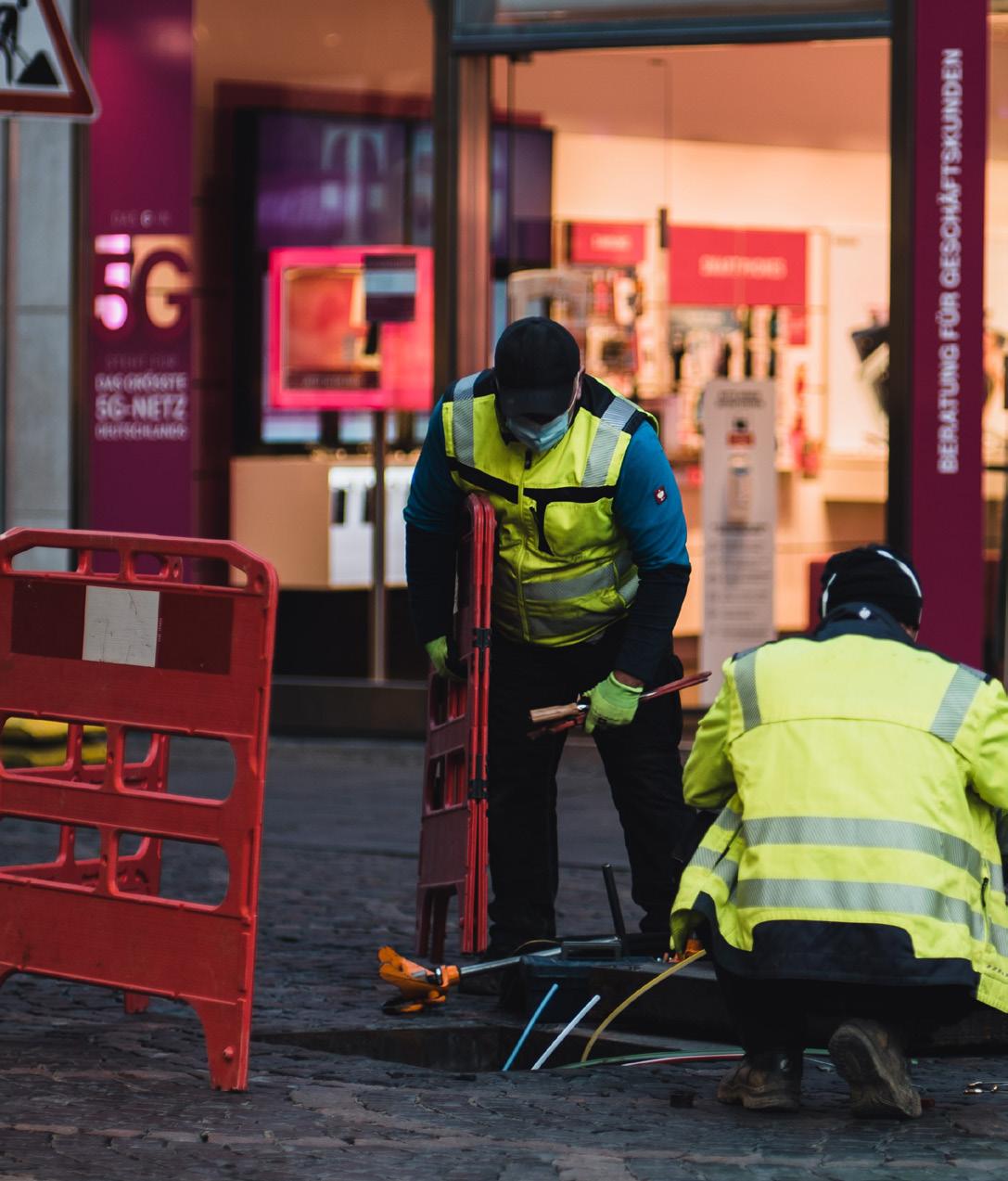
infrastructure,” says Abbas.
“This is a model for across Africa. It provides a 46% saving on trenching. That makes it one way to increase connectivity quicker. You just need to get the approvals which is difficult in different countries –there is a different process in Angola compared to South Africa compared to Kenya compared to Zambia.”
He adds that a major issue for the rollout of FOCUS™ is the traditional mindset of many CTOs and CIOs. “You can’t keep thinking that fibre, water, gas, and electricity should be laid in certain areas. It’s an open access scenario – if there is a possibility of sharing the trench then it should be shared. It helps reduce costs which is good for consumers.”
Link Africa has already proven
FOCUS™ across large parts of KZN and the plan is to continue rolling out as much as possible across sub-Saharan Africa, in partnership with like-minded organisations. Around 10,000km of Link Africa fibre combined with BitCo’s remote access to existing towers makes for a holistic package that few other independents can match.
Many in South Africa still rely on weak wireless connectivity, and some remain totally unconnected. For society to advance meaningfully, this must change. By the end of this year, the SA government would like to have 80% of people with full access to the internet alongside growing highspeed fibre networks to improve fixed speeds – which have doubled over the

past three years. Link Africa is playing its part, and with BitCo now part of the journey, Abbas is excited about the impact the company can have.
“It is still new as the structure is all new,” he says of the organisation now made up of three companies. “We have a new ExCo between Link Africa and BitCo and Cloud Dynamics, and we are rolling out a new strategy for the next 18 months. It’s very exciting and it is a combined family. The three companies sit together and define the roadmap for the next three to five years.
“We are not unrealistic and we are still looking for 15% market share in South Africa. We are also looking at expansion outside of SA,” he adds. “We understand that there will be consolidation in SA and so we must continue to show our value as a
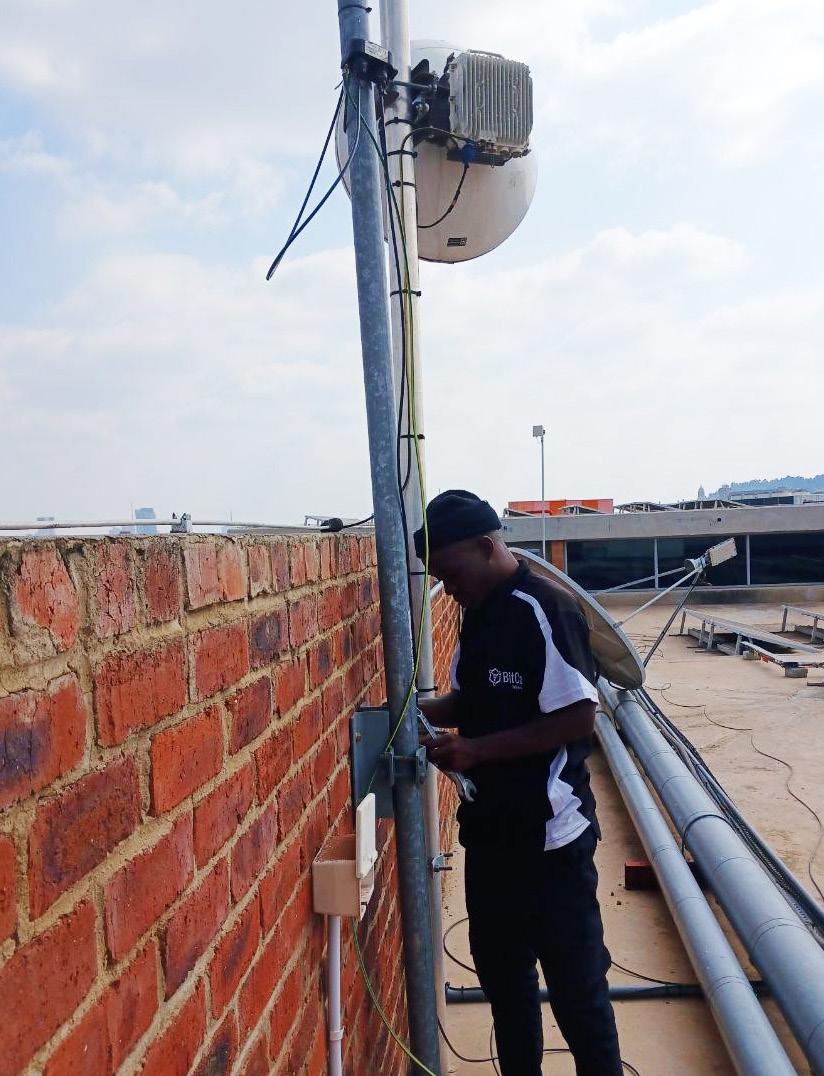
company. The aim is to make sure we achieve double digit growth and increase capacity in our customer base. We are in the process of bringing on new shareholders post-acquisition and that opens the door for new investment so that adds to the excitement.”
The agile and nimble approach to growth has been impressive, and in just 12-months Link Africa has taken big strides. Overcoming macroeconomic challenges including significantly lacking investor confidence, weak infrastructure, political uncertainty, and well-documented power issues to name a few, the company has remained laser focused on its core vision, changing with the times to bring value to consumers.
“If we stayed as we were 18 months ago, we would have been in trouble,” admits Abbas. “We always look at
ways of reinventing ourselves and we must continuously find ways to bring benefits for end users. We are under huge macro-economic challenges in Africa and yet we are growing, and that is extremely pleasing.”
Reliable networks, provided at affordable prices, across fixed and wireless infrastructure, through openaccess models makes Link Africa not just a supplier but a partner to the modern, technological South Africa of the day. After the acquisition, the company is now better placed than ever to push its vision of universal digital inclusion.
Content sponsored by Link Africa

